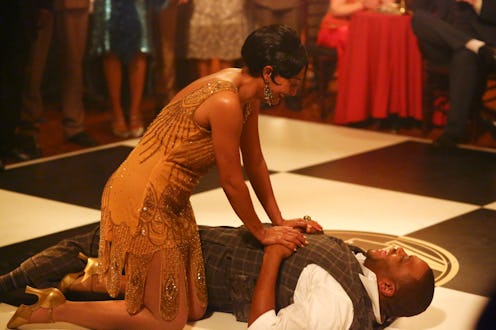Entertainment
'black-ish' Goes Back to the '20s For Its Finale

It's mid-May, so I don't know why I'm surprised, but black-ish Season 1 is over, and as their finale, they roped in Diddy and Mary J. Blige as a pair of 1920's superstars. "Pops' Pops' Pops" Isn't really a thematic climax to the season, except in the sense that that it's about another time where affluent black families struggled with their identities. So in that case, I guess taking a trip back to Pops' version of the Harlem Renaissance was an interesting idea. And it's executed well — the budget clearly went towards not just the guest stars, but towards a great set and some charming (if not 100 percent period-accurate) costumes. Overall, it was a way for the show to indulge in a somewhat goofy storyline without being tethered to the real stakes of the show (I don't think even black-ish would have Dre inventing breakdancing for real).
I can't really remember most of the alternate character names, but dancin' Jack (Jolly?), flapper Zoe, and little Their Eyes Were Watching Diane were all charming as hell, while the Charleston Bow & Dre love story played on the affection between the characters, which I find often one of the best things about the characters' relationship. And Mary J. Blige and Diddy's performances... were meant to be fun, even if they didn't really reach much higher than that.
And at the risk of making everything too serious, framing this as a way for the Johnsons to look back on their family history was fabulous. Instead of making it a serious reflection on slavery, or cast them in a hard-scrabble Good Times riff, it instead brought it to a time where black people owned businesses, ran dance contests, and partied all night, with only small nods at the oppression that was obviously going on at the time. Instead, the show created a narrative that showed the Johnsons were the same pampered, spoiled clowns that they are in 2015 — Bow was frantic, Pops was wonderfully corrupt, Dre's big mouth and oversized romanticism got him trouble, and so on. It's wish fulfillment that at the same time isn't ignorant of just how wishful it is (not a lot of black families, or American families period, can look back 100 years to find captains of industry).
black-ish didn't always have the most inventive Season 1, but when it was working, it perfectly combined progressiveness with laughs, and since Season 2 was just confirmed, hopefully it will continue the trend.
Image: Michael Ansell/ABC (2)